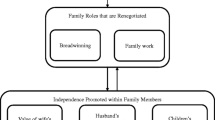Abstract
This paper suggests that the employment behavior and stated preferences of new mothers are not simply a product of choices that individual women make or characteristics that they have. Rather, using qualitative interview data from a sample of new parents, this paper illustrates some of the interactional and institutional contexts in which new mothers' approaches to paid work are embedded, with a particular focus on gender. Among the themes explored are the influence of husbands' preferences on women's “decisions,” the role of economic processes in structuring parenting arrangements, as well as the prominence of gendered cultural imagery in new parents' accounts about their work and family arrangements.
Similar content being viewed by others
REFERENCES
Behrman, D. (1982). Family and/or career plans of first-time mothers. Ann Arbor, MI: UMI Research Press.
Belsky, J., and Kelly, J. (1994). The Transition to Parenthood. New York: Delacorte Press.
Berger, P., and Luckmann, T. (1963). The social construction of reality. New York: Anchor Books.
Blumberg, R., and Coleman, M. (1989). A theoretical look at the gender balance of power in the American couple. Journal of Family Issues, 10, 225–250.
Collins, P. H. (1994). Shifting the center: Race, class, and feminist theorizing about motherhood. In D. Bassin, M. Honey, and M. M. Kaplan (Eds.), Representations of motherhood (pp. 56–74). New Haven: Yale University Press.
Cowan, C. P., and Cowan, P. A. (1992). When partners become parents. New York: Basic Books.
Desai, S., and Waite L. (1991). Women's employment during pregnancy and after the first birth: Occupational characteristics and work commitment. American Sociological Review, 56, 551–566.
DeVault, M. L. (1991). Feeding the family. Chicago: University of Chicago Press.
Epstein, C. F. (1988). Deceptive distinctions: Sex, gender, and the social order. New Haven: Yale University Press.
Fitz Gibbon, H. M. (1995). The development of a feminist consciousness in family day care providers. Paper presented at the 90th Annual Meeting of the American Sociological Association, Washington, D.C.
Gerson, K. (1985). Hard choices. Berkeley: University of California Press.
Glaser, B. and Strauss, A. (1967). The discovery of grounded theory. New York: Aldine de Gruyter.
Glenn, E. N. (1994). Social constructions of mothering: A thematic overview in Mothering: Ideology, experience, and agency, edited by Glenn, E., Chang, G., and Forcey, L. New York: Routledge.
Gray, E., Lovejoy, M., Piotrkowski, C., and Bond, J. (1990). Husband supportiveness and the well-being of employed mothers of infants. Families in Society: The Journal of Contemporary Human Services, June, 332–341.
Hertz, R. (1986). More equal than others. Berkeley: University of California Press.
Hertz, R., and Ferguson, F. (1996). Childcare choices and constraints in the United States: Social class, race and the influence of family views. Journal of comparative family studies, 25, mimeo.
Hochschild, A. with Machung, A. (1989). The second shift. New York: Viking Press.
Hock, E., Gnezda, T., and McBride, S. (1984). Mothers of infants: Attitudes toward employment and motherhood following birth of the first child. Journal of Marriage and the Family, May, 425–431.
Hock, E., Morgan, K., and Hock, M. (1985). Employment decisions made by mothers of infants. Psychology of Women Quarterly, 9, 383–402.
Lewis, S. (1991). Motherhood and employment: The impact of social and organizational values In A. Phoenix, A. Woollett, and E. Lloyd (Eds.), Motherhood (pp. 195–215). Newbury Park, CA: Sage Publications.
Margolis, M. (1984). Mothers and such. Berkeley: University of California Press.
Mason, K., and Kuhlthau, K. (1989). Determinants of child care ideals among mothers of preschool-aged children. Journal of Marriage and the Family, 51, 593–603.
McHale, S., and Huston, T. 1984. Men and women as parents: Sex role orientations, employment, and parental roles with infants. Child Development, 55, 1349–1361.
Miles, M. B., and Huberman, A. M. (1994). Qualitative data analysis: An expanded sourcebook. Thousand Oaks: Sage Publications.
Miller, B. C., and Sollie, D. L. 1980. Normal stresses during the transition to parenthood. Family Relations, 29, 459–465.
Morgan, K., and Hock, E. (1984). A longitudinal study of psychosocial variables affecting the career patterns of women with young children. Journal of Marriage and the Family, May, 383–390.
Nelson, M. (1994). Family day care providers: Dilemmas of daily practice. In E. N. Glenn, G. Chang, and L. Forcey (Eds.), Mothering: Ideology, experience, and agency (pp. 181–209). New York: Routledge.
Scarr, S., Phillips, D., and McCartney, K. (1989). Working mothers and their families. In A. Skolnick and J. Skolnick (Eds.), Family in transition, 8th ed., (pp. 411–427). New York: HarperCollins Publishers, Inc.
Scott, J., and Alwin, D. F. (1989). “Gender differences in parental strain: Parental role or gender role?” Journal of Family Issues, 10, 482–503.
Shuster, C. (1993). A typology of maternal responses to integrating parenting and employment. Family Relations, 42, 13–20.
Spitze, G. (1988). Women's employment and family relations. Journal of Marriage and the Family, 50, 595–618.
Thompson, L., and Walker, A. (1989). Gender in families: Women and men in marriage, work, and parenthood. Journal of Marriage and the Family, 51, 845–871.
Volling, B., and Belsky, J. (1993). Parent, infant, and contextual characteristics related to maternal employment in the first year of infancy. Family Relations, 42, 4–12.
Walzer, S. (1996). Gender and transitions into parenthood. Ann Arbor, MI: UMI Dissertation Services.
West, C., and Fenstermaker, S. (1993). Power, inequality, and the accomplishment of gender: An ethnomethodological view. In England, P. (Ed.), Theory on gender/Feminism on theory (pp. 151–174).
West, C., and Zimmerman, D. (1987). Doing gender. Gender and Society, 1, 125–151.
Wenk, D., and Garrett, P. (1992). Having a baby: Some predictions of maternal employment around childbirth. Gender and Society, 6, 49–65.
Author information
Authors and Affiliations
Rights and permissions
About this article
Cite this article
Walzer, S. Contextualizing the Employment Decisions of New Mothers. Qualitative Sociology 20, 211–227 (1997). https://doi.org/10.1023/A:1024761618294
Issue Date:
DOI: https://doi.org/10.1023/A:1024761618294




